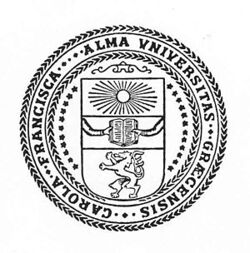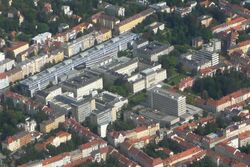Difference between revisions of "University of Graz"
(Created page with "{{group |wikipedia=https://en.wikipedia.org/wiki/University_of_Graz |constitutes=university |website=https://www.uni-graz.at/en/ |leaders= |logo= |twitter= |start= |headquarte...") |
(unstub) |
||
| Line 4: | Line 4: | ||
|website=https://www.uni-graz.at/en/ | |website=https://www.uni-graz.at/en/ | ||
|leaders= | |leaders= | ||
| − | |logo= | + | |logo=University of Graz seal.jpg |
|twitter= | |twitter= | ||
| − | |start= | + | |start=1585 |
|headquarters=Graz, Austria | |headquarters=Graz, Austria | ||
| + | |description=Significant Slovene/Croat connection | ||
}} | }} | ||
| + | The '''University of Graz''' (''Karl-Franzens-Universität Graz''), located in [[Graz]], [[Austria]], is the largest and oldest [[university]] in [[Styria]], as well as the second-largest and second-oldest university in Austria. | ||
| + | |||
| + | The university was founded in 1585 by Archduke [[Charles II of Austria]]. The bull of 1 January 1586, published on 15 April 1586, was approved by [[Pope Sixtus V]].<ref>http://www.newadvent.org/cathen/06733d.htm|title=University of Graz</ref> For most of its existence it was controlled by the Catholic Church, and was closed in 1782 by Emperor [[Joseph II, Holy Roman Emperor|Joseph II]] in an attempt to gain state control over educational institutions. Joseph II transformed it into a ''lyceum'', where civil servants and medical personnel were trained. In 1827 it was re-instituted as a university by Emperor [[Francis II, Holy Roman Emperor|Francis I]], thus gaining the name ''Karl-Franzens-Universität'', meaning ''Charles Francis University''. Over 30,000 students are currently enrolled at the university. | ||
| + | |||
| + | The university is divided into six faculties, the two largest are the Faculty of [[Arts]] and [[Humanities]] and the Faculty of [[Natural Sciences]]. The other faculties are the Faculty of [[Law]]; the Faculty of Business, Economic and [[Social sciences]]; the Faculty of Environmental, Regional and Educational Sciences; and the Faculty of [[Catholic]] [[Theology]]. The Faculty of Medicine was separated from the university by state legislation in 2004 and became an independent university – the [[Medical University of Graz]]. The faculties offer a wide range of undergraduate (BA, BSc), graduate (MA, MSc), and doctoral degree (PhD) programmes, as well as special teaching degrees in their specific areas of expertise. | ||
| + | |||
| + | Since its re-installation, the university has been home to many internationally renowned scientists and thinkers. [[Ludwig Boltzmann]] was professor at the university twice, first from 1869 to 1873 and then from 1876 to 1890, while he was developing his statistical theory of heat. Nobel Laureate [[Otto Loewi]] taught at the university from 1909 till 1938 and [[Victor Franz Hess]] (Nobel prize 1936) graduated in Graz and taught there from 1920 to 1931 and from 1937 to 1938. The physicist [[Erwin Schrödinger]] briefly was chancellor of the university in 1936. | ||
| + | |||
| + | The University of Graz does not have a distinct faculty of engineering, however, [[Graz University of Technology]], which is focused on engineering and technology, offers inter-university undergraduate and postgraduate programmes in cooperation with the university's Faculty of Natural Sciences under the name "NAWI Graz". The main intention behind the cooperation was to avoid duplication of efforts and infrastructure, especially in cost-intensive subjects such as chemistry, industrial chemistry, physics, and geosciences, as both universities are located in close proximity to each other. Students enrolled in one of these programmes attend lectures and seminars at both universities and are awarded a combined degree at the end of their studies. | ||
| + | |||
| + | Because of the university's geographical location close to the Slovenian border and the two major Slovenian cities, [[Maribor]] and [[Ljubljana]], it has traditionally attracted many students from Slovenia and served as a gateway to South-East Europe for Austrian scholars, scientists and businesses. The establishment of the Department for Slovene Language and Literature at the University of Graz, for example, laid the foundation for scholarly studies of Slovenian culture, literature, and language bundled in the so-called [[Slovene studies]].<ref>http://london.veleposlanistvo.si/index.php?id=3162</ref> | ||
| + | |||
| + | == Notable alumni == | ||
| + | [[File:University of Graz.jpg|thumb|250px|Aerial photography of the main campus]] | ||
| + | |||
| + | *[[Ivo Andrić]], Yugoslav writer and Nobel Prize laureate | ||
| + | *[[Lasgush Poradeci]], Albanian philologist, poet and writer | ||
| + | *[[Gabriel Anton]], Austrian neurologist and psychiatrist | ||
| + | *[[Count Anton Alexander von Auersperg]], Austrian poet and politician | ||
| + | *[[Milko Brezigar]], [[Yugoslavia|Yugoslav]] economist | ||
| + | *[[Safet Butka]], Albanian politician | ||
| + | *[[Izidor Cankar]], [[Slovenia]]n art historian and Yugoslav diplomat | ||
| + | *[[Etbin Henrik Costa]], Slovenian politician | ||
| + | *[[Monika Fludernik]], Austrian literary scholar | ||
| + | *[[Karl Gurakuqi]], Albanian linguist and folklorist | ||
| + | *[[Juraj Habdelić]], [[Croatia]]n writer | ||
| + | *[[Emil Johann Lambert Heinricher]], Austrian botanist | ||
| + | *[[Archbishop Ieronymos II of Athens]], [[Archbishop of Athens]] | ||
| + | *[[Ernst Kaltenbrunner]], Austrian-born senior SS official of Nazi Germany, executed for war crimes | ||
| + | *[[Janko Kersnik]], Slovenian writer | ||
| + | *[[Ferdinand Konščak]], Croatian Jesuit missionary and cartographer | ||
| + | *[[Karel Lavrič]], Slovenian politician | ||
| + | *[[Leo Leixner]], war correspondent | ||
| + | *[[Franz Miklosich]], Austrian-Slovenian linguist | ||
| + | *[[Heinz Oberhummer]], Austrian physicist | ||
| + | *[[Vladimir Šubic]], Slovenian architect | ||
| + | *[[Nikola Tesla]], Serbian-American inventor, physicist, electrical engineer, mechanical engineer, and futurist (did not receive a degree and did not continue beyond the first semester of his third year, during which he stopped attending lectures) | ||
| + | *[[Lovro Toman]], Slovenian politician | ||
| + | *[[Petina Gappah]], author and International lawyer | ||
| + | *[[Franz Unger]], Austrian paleontologist | ||
| + | *[[Leopold von Sacher-Masoch]], Austro-Ukrainian journalist and writer of Masochism | ||
| + | *[[Gregory Weeks]], jurist and historian | ||
| + | *[[Milan Zver]], Slovenian sociologist and politician | ||
| + | |||
{{SMWDocs}} | {{SMWDocs}} | ||
==References== | ==References== | ||
{{reflist}} | {{reflist}} | ||
| − | |||
Revision as of 05:44, 5 February 2021
(University) | |
|---|---|
 | |
| Formation | 1585 |
| Headquarters | Graz, Austria |
| Significant Slovene/Croat connection | |
The University of Graz (Karl-Franzens-Universität Graz), located in Graz, Austria, is the largest and oldest university in Styria, as well as the second-largest and second-oldest university in Austria.
The university was founded in 1585 by Archduke Charles II of Austria. The bull of 1 January 1586, published on 15 April 1586, was approved by Pope Sixtus V.[1] For most of its existence it was controlled by the Catholic Church, and was closed in 1782 by Emperor Joseph II in an attempt to gain state control over educational institutions. Joseph II transformed it into a lyceum, where civil servants and medical personnel were trained. In 1827 it was re-instituted as a university by Emperor Francis I, thus gaining the name Karl-Franzens-Universität, meaning Charles Francis University. Over 30,000 students are currently enrolled at the university.
The university is divided into six faculties, the two largest are the Faculty of Arts and Humanities and the Faculty of Natural Sciences. The other faculties are the Faculty of Law; the Faculty of Business, Economic and Social sciences; the Faculty of Environmental, Regional and Educational Sciences; and the Faculty of Catholic Theology. The Faculty of Medicine was separated from the university by state legislation in 2004 and became an independent university – the Medical University of Graz. The faculties offer a wide range of undergraduate (BA, BSc), graduate (MA, MSc), and doctoral degree (PhD) programmes, as well as special teaching degrees in their specific areas of expertise.
Since its re-installation, the university has been home to many internationally renowned scientists and thinkers. Ludwig Boltzmann was professor at the university twice, first from 1869 to 1873 and then from 1876 to 1890, while he was developing his statistical theory of heat. Nobel Laureate Otto Loewi taught at the university from 1909 till 1938 and Victor Franz Hess (Nobel prize 1936) graduated in Graz and taught there from 1920 to 1931 and from 1937 to 1938. The physicist Erwin Schrödinger briefly was chancellor of the university in 1936.
The University of Graz does not have a distinct faculty of engineering, however, Graz University of Technology, which is focused on engineering and technology, offers inter-university undergraduate and postgraduate programmes in cooperation with the university's Faculty of Natural Sciences under the name "NAWI Graz". The main intention behind the cooperation was to avoid duplication of efforts and infrastructure, especially in cost-intensive subjects such as chemistry, industrial chemistry, physics, and geosciences, as both universities are located in close proximity to each other. Students enrolled in one of these programmes attend lectures and seminars at both universities and are awarded a combined degree at the end of their studies.
Because of the university's geographical location close to the Slovenian border and the two major Slovenian cities, Maribor and Ljubljana, it has traditionally attracted many students from Slovenia and served as a gateway to South-East Europe for Austrian scholars, scientists and businesses. The establishment of the Department for Slovene Language and Literature at the University of Graz, for example, laid the foundation for scholarly studies of Slovenian culture, literature, and language bundled in the so-called Slovene studies.[2]
Notable alumni
- Ivo Andrić, Yugoslav writer and Nobel Prize laureate
- Lasgush Poradeci, Albanian philologist, poet and writer
- Gabriel Anton, Austrian neurologist and psychiatrist
- Count Anton Alexander von Auersperg, Austrian poet and politician
- Milko Brezigar, Yugoslav economist
- Safet Butka, Albanian politician
- Izidor Cankar, Slovenian art historian and Yugoslav diplomat
- Etbin Henrik Costa, Slovenian politician
- Monika Fludernik, Austrian literary scholar
- Karl Gurakuqi, Albanian linguist and folklorist
- Juraj Habdelić, Croatian writer
- Emil Johann Lambert Heinricher, Austrian botanist
- Archbishop Ieronymos II of Athens, Archbishop of Athens
- Ernst Kaltenbrunner, Austrian-born senior SS official of Nazi Germany, executed for war crimes
- Janko Kersnik, Slovenian writer
- Ferdinand Konščak, Croatian Jesuit missionary and cartographer
- Karel Lavrič, Slovenian politician
- Leo Leixner, war correspondent
- Franz Miklosich, Austrian-Slovenian linguist
- Heinz Oberhummer, Austrian physicist
- Vladimir Šubic, Slovenian architect
- Nikola Tesla, Serbian-American inventor, physicist, electrical engineer, mechanical engineer, and futurist (did not receive a degree and did not continue beyond the first semester of his third year, during which he stopped attending lectures)
- Lovro Toman, Slovenian politician
- Petina Gappah, author and International lawyer
- Franz Unger, Austrian paleontologist
- Leopold von Sacher-Masoch, Austro-Ukrainian journalist and writer of Masochism
- Gregory Weeks, jurist and historian
- Milan Zver, Slovenian sociologist and politician
Alumni on Wikispooks
| Person | Born | Died | Nationality | Summary | Description |
|---|---|---|---|---|---|
| Martin Bartenstein | 3 June 1953 | Austria | Politician Businessperson | Double Bilderberg Austrian businessman and politician | |
| Peter Handke | 6 December 1942 | Austria | Author | ||
| Valentin Inzko | 22 May 1949 | Austria | Diplomat Deep state operative | Austrian diplomat with deep state job as High Representative for Bosnia and Herzegovina | |
| Josef Krainer | 26 August 1930 | 30 December 2016 | Austria | Politician | Austrian conservative (ÖVP) politician and Governor of Styria who attended the 1989 Bilderberg meeting. |
| Wolfgang Leitner | 27 March 1953 | Austria | Billionaire Businessperson | Austrian billionaire businessman. Started pharma company with fellow Bilderberger and minister for economy Martin Bartenstein. | |
| Bernhard Worms | 14 March 1930 | Germany | Politician | German politician who attended Le Cercle in Bonn in 1983. |
